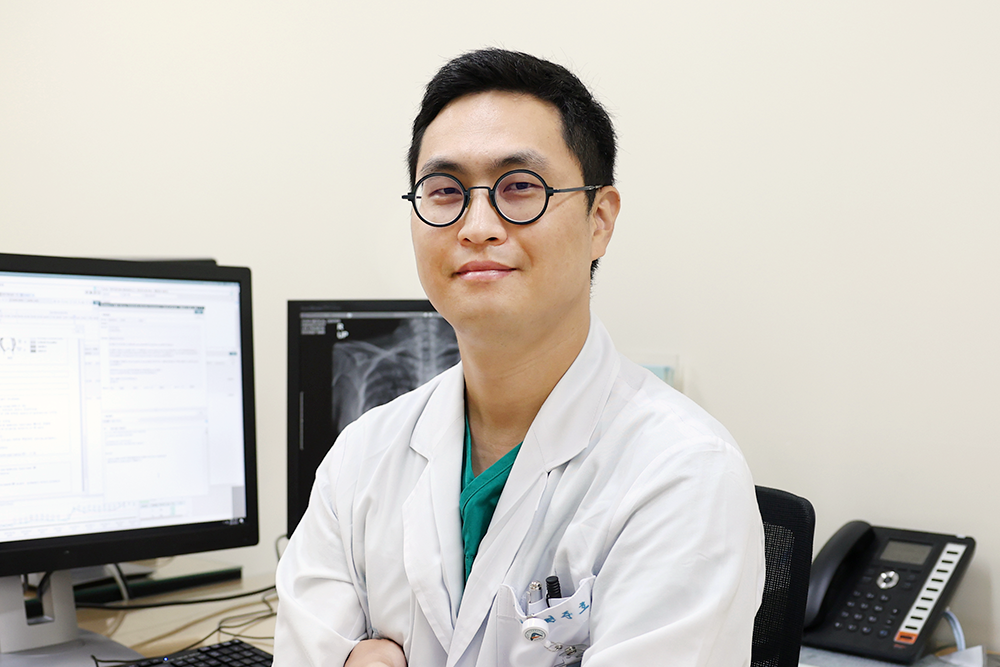-
- Global AMC MENU
- NEWS
- HEALTH
- PEOPLE
- Introduction
Professor Junho Hyun of the Division of Cardiology

A patient with cardiomyopathy leading to heart failure refused to undergo surgery on the day of his transplantation. Even the patient’s daughter could not sway his decision and could only shed tears. Professor Junho Hyun was initially taken aback but patiently persuaded the daughter and eventually changed the patient’s mind. For a while after the transplantation, the patient suffered from vomiting and sepsis, enduring immense suffering. However, now, Professor Hyun sees him at outpatient clinics, and he appears nothing short of healthy. “That experience is etched in my memory. While the patient’s decision must be respected, I realized I need to persevere in some moments, no matter what. How can I give up when I can save a patient’s life?”
Like Carefully Shaping Pottery
Professor Junho Hyun often treats heart failure patients with the most severe heart dysfunction, even within the Division of Cardiology. These patients experience breathlessness and have difficulty going out or eating, leaving them with a diminished quality of life, and they hold onto hope for heart transplantation. Professor Hyun always makes meticulous observations of the patient’s condition, crucial to post-transplant success. “The moment an infection occurs, there is a heart attack. Some patients succumb to their condition before transplantation, often due to intestinal necrosis. Even minor coughs or back pain require investigation for the cause. Only what I intend to see is what becomes apparent. I painstakingly refine each patient's condition through a step-by-step process. It is like carefully shaping pottery.” Hospitalization is inevitable until heart transplantation, only that the exact date is unknown. Doctors are as burdened as the patients. “If we consider only the efforts of the medical team and the hospital’s profits, giving patients the best care would be difficult. However, Asan Medical Center has grown and developed medical care standards through intensive critical care with multidisciplinary care from diverse departments. That is a value I take pride in."
There was a patient who was bedridden due to resistant bacteria following a heart transplantation. During each visit, Professor Hyun conducted brief rehabilitation exercises. Initially, the patient's legs were quite shaky, and they had difficulty standing properly. However, after several months, the patient was able to firmly plant both feet on the ground. Upon Professor Hyun's suggestion, 'Why don't you take a look at the Han River? It has been close by, but you have not seen it in a long time, have you?' the patient cried for an extended period with his gaze fixed. The patient expressed, “I should have been in heaven already, but thank you for giving me a new lease of life.”
Refusing to Give In, Experiencing Failures, and Finding Joy
Professor Junho Hyun was not particularly enthusiastic about studying during school. His sole passion was biology. So, when he decided to apply for medical school, his homeroom teacher dismissed it, saying his grades were not good enough. Refusing to give in, he started studying hard and was successfully admitted to the medical school he had set his sights on. His enthusiasm for learning came late but was unstoppable. As he developed an interest in the dynamic field of cardiology, he applied to Asan Medical Center, known for its strong presence in cardiology. However, his self-assurance waned when he failed the internal medicine resident exam. He began his internal medicine residency with juniors after his military service, but as he struggled to keep up, his appetite disappeared, and he spent sleepless nights. Within the first month, he lost around 10 kilograms in weight. "The experience of a major breakdown turned out to be a blessing in disguise. I realized I was starting from scratch and began rebuilding everything piece by piece. Since Asan Medical Center is visited by patients in severe conditions, I gained valuable insights by closely examining each case and experienced the joyful sense of achievement that comes from accumulating knowledge.” When he was in charge of the CCU, he would stay by the patient's side if their condition worsened. During his faculty rounds, he did not hesitate to voice his thoughts. Whenever he encountered something new, he could not wait to share it with someone. It was this sense of fulfillment that made him willing to stay up all night and be anxious about the patient's condition. That passion remains unchanged to this day.
Searching Answers to Endless Questions
Fifteen years ago, a critically ill patient was admitted to Asan Medical Center with a diagnosis of peripartum cardiomyopathy, both before and after giving birth. This was contrary to the commonly expected favorable course of peripartum cardiomyopathy. Since conventional tests could not identify the cause, genetic testing was performed, revealing hypertrophic cardiomyopathy. Subsequently, a biopsy of the heart removed during transplantation confirmed the genetic diagnosis. “It was astonishing that we can now distinguish the cause of cardiomyopathy through genetics. While this may not drastically alter treatment methods, it enables us to predict treatment outcomes. At times, deciding whether to proceed with transplantation is challenging. However, when the cause is clear, we can make more definitive treatment decisions. I believe a time will come in the Division of Cardiology when genetic variations determine disease classifications.”
There is still much to explore in cardiac transplantation because very little research has been conducted, and it is not an easy endeavor. Therefore, Professor Junho Hyun holds high expectations for the journey of finding answers. “My ambition is crystal clear. I aspire to be a doctor who delivers high-quality medical care and makes a meaningful impact. After my medical sessions, I often reflect on whether I could have been more compassionate and empathetic. While I acknowledge my imperfections, I aim for my patients to have trust in me, particularly when it comes to my medical skills.”












